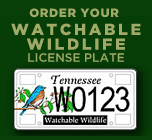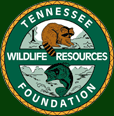Migration is all but complete. Birds are busy nesting and creating the next generation.
Ruby-throated hummingbirds are also here in Tennessee. Although reports from folks indicate it's been a bit of a 'strange' year for the number of birds at your feeders. It's too soon to tell exactly what's going on, but there are a few things to consider.
First, weather. It has a lot do with migration patterns overall. The storms and unusal cold up till now may have short-stopped hummers for a bit and when they did finally arrive they got busy nesting since there was no time for delays. Additionally, birds in general don't operate on our calendar. They do what's best for them in order to survive.
Second, we do know from banding that hummingbirds do return to their feeding and breeding grounds...HOWEVER, it's not a static point but more in the range of a 1/2 mile or so. So 'your' birds could very well be next door or down the block. Look around and see what's changed outside YOUR own backyard since last season? Storm damage? New subdivision? Clear cutting? Things may be exactly the same in your yard, but what happens along that migration route does make a difference.
Thirdly, when hummers return in spring they have a clear mission...reproduce to replace themselves. That drive is guided by hormones and instinct; it's that simple. So hummer don't have time to linger at our feeders like they do in fall when breeding season is complete. Plus they don't need to 'get fat' since they're not going anywere...so they only take it what they need.
Next, our feeders are man-made and contain artificial food. Hummingbirds always prefer natural resources when nesting. So again, they don't truly need our feeders but use them as a source of quick food or hydration. Also remember a hummingbird's diet is 80% soft-bodied insects. Is this food source being interrupted with pesticides? Perhaps not in your yard, but your neighbor or HOA? If there are no insects hummers may zip through for a quick drink but they certainly won't stay.
Next, and this relates to natural food sources and nesting...females spend 75-80% of their day incubating their eggs or tending to the young. So again, they don't ahve time to linger at our feeders.
Next, hundreds if not thousands of additonal people in our town, your country or your State are now feeding hummingbirds. It's the 'new' thing to do since COVID. Thus there is a much wider distribution of the same number of hummingbirds. You may once have been the only feeder on your block where now everyone has one...and remember hummers feed on a 1/2 mile or more loop. So if the habitat is better elsewhere they'll next there and be there more often.
Finally, since a good many people, especially those who are so new to feeding hummingbirds, remember the numbers and behavior of the hummingbirds at their feeders in August and early September and don't realize that breeding time and migration time are greatly different whether your host one hummer or 100. Not every hummingbird seen last seaason will return. Only 1 in 5 fledglings will live to return. Migration is difficult even for a seasoned traveler. And truth be told we humans are doing things to make it even harder.
So in conclusion, please know we hear your concerns and we're watching!
You can help by keeping feeders free of black mold, keeping nectar fresh and free of insects. DO NOT USE RED DYE, ARTIFICIAL SWEETNERS, HONEY, RAW SUGAR, ADDITIVES OR EXTENDERS in your nectar NO MATTER what the package says. MAKE YOUR OWN NECTAR - 4 part water to 1 part white cane sugar period. DO NOT put out cold nectar - it can cause cold shock. Flowers don't freeze or put out cold nectar on a hot day...so don't worry about the temerpature of the nectar BUT THE QUALITY OF IT. If you have ant, bee or wasp issues DO NOT use anything foreign anywhere near your feeders. NO vaseline, peppermint oil, shortening, Skin-so-Soft...NOTHING. Get an ant moat, check for leaks or spilled nectar. Get a different feeder...a saucer type helps with bees and wasps. ALWAYS CONSIDER ALL THE CONSEQUENCES OF AN ACTION not just getting rid of the immediate issue. But if I do this, how will it effect my hummingbirds? And if the answer is a negative one or you don't know...then DO NOT DO IT. Better safe than sorry because a hummer's life can depend on that decision.
IMPORTANT NOTICE: If you encounter a sick bird please report it to the link below. If you encounter an injured bird please contact your nearest rehabber. Please continue weekly maintenaince on your seed feeders. Anytime birds artificially gather together to feed there is always the chance of transmission of disease so cleanliness is essential. If you encounter sick or dead birds here's the link to TWRA at: Sick Birds





















